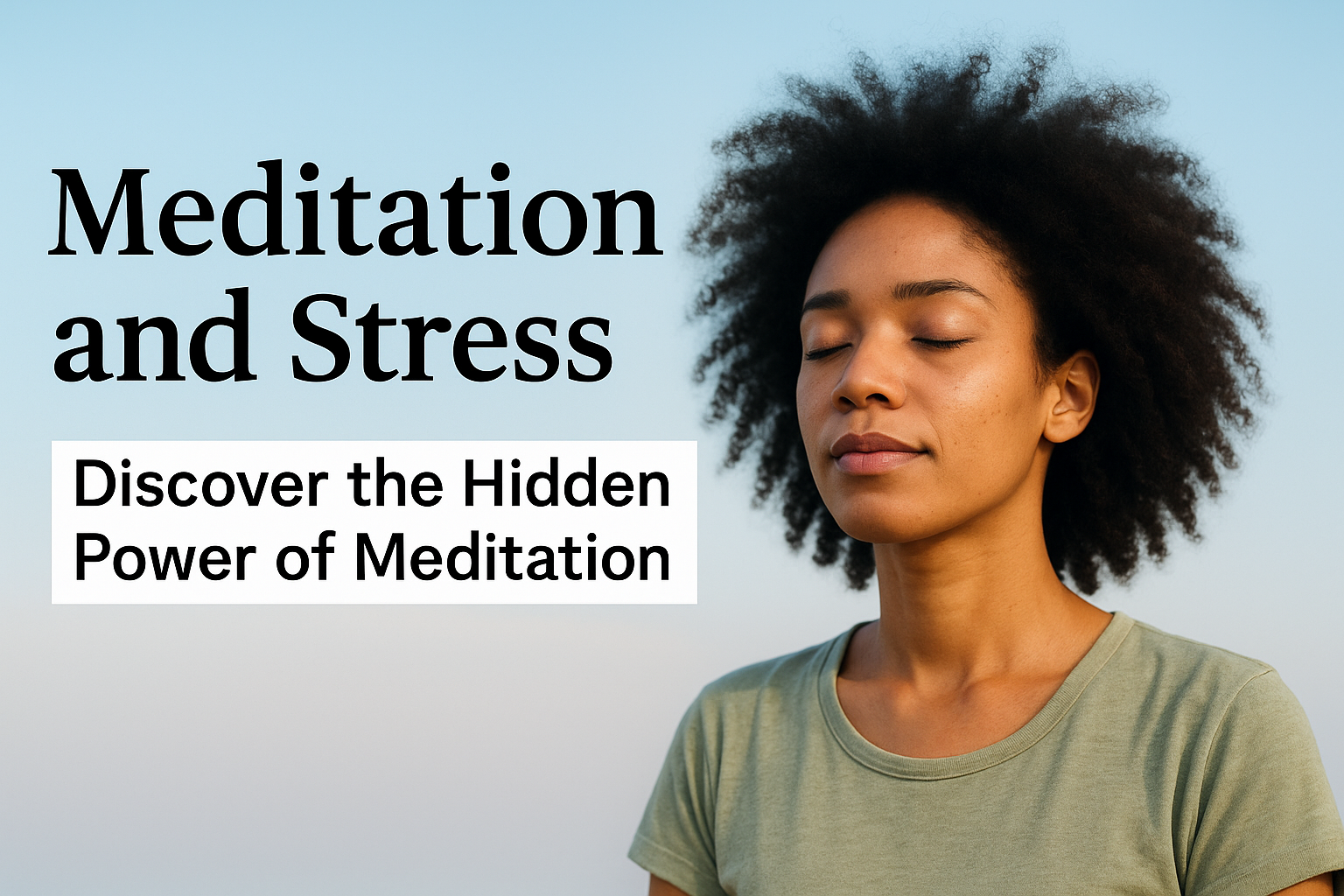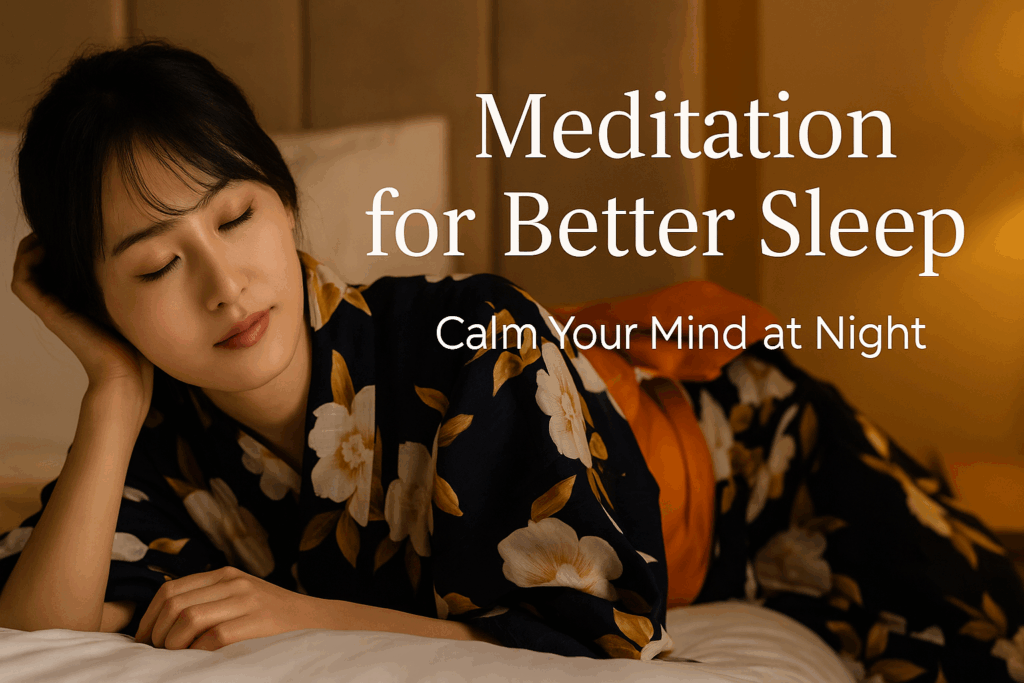
Meditation for better sleep isn’t just a wellness trend—it’s a proven method to calm the racing mind and invite restful sleep.
If you’re like me, nights can be the hardest.
My body’s tired, but my thoughts are wide awake—rehashing conversations, replaying tomorrow’s to-dos.
And although I’ve struggled with sleep for years, I’ve found something surprisingly simple that helps: meditation.
It doesn’t take long.
Just 5 to 10 minutes of mindfulness breathing or body scanning often shifts me into a more relaxed state—one that sleep can finally reach.
But here’s the thing: I’ve learned the timing matters.
If I meditate right before bed, it sometimes energizes me too much.
So instead, I do it 30 minutes before lights out. That’s my sweet spot—enough time to calm down without overstimulating.
And I’m not alone.
Scientific research from JAMA and other journals confirms what many of us feel: mindfulness meditation improves sleep quality, especially for people dealing with stress or insomnia.
In this article, we’ll explore exactly why meditation helps you sleep better, and how to make it part of your nightly routine—even if your mind feels anything but calm right now.
Let’s begin with the science.

About the Author: Yosuke
Yosuke is the creator of Still Strong Blog, where he writes about meditation, mindset, and building a calm, meaningful life.
Living in Japan, he shares insights as someone with HSP, ASD tendencies, and social anxiety—hoping to inspire others on a journey toward quiet strength.
Follow me on X (formerly Twitter)
🧠 Why Meditation Helps You Sleep Better

Struggling to sleep isn’t just about a restless body—it’s usually a restless mind.
That’s where meditation comes in. It gives your thoughts somewhere to land before they spiral out of control.
Scientifically speaking, mindfulness meditation activates the parasympathetic nervous system—the part of your brain responsible for “rest and digest.”
When you practice even a few minutes of focused breathing or body awareness, your heart rate slows, cortisol levels drop, and your brain starts preparing for sleep.
A 2015 randomized clinical trial published in JAMA Internal Medicine showed that older adults who practiced mindfulness meditation had significantly better sleep quality and reduced daytime fatigue, compared to those in standard sleep education programs.
Another 2014 meta-analysis concluded that meditation improves not only sleep but also emotional well-being, reducing the anxiety that often keeps us awake.
But beyond the science, here’s what it feels like:
When you meditate, your mind finally stops chasing.
Thoughts may still come, but they pass—like clouds, not storms.
You’re no longer trying to force sleep. You’re inviting it.
And that’s the key.
Meditation isn’t about making sleep happen.
It’s about creating the mental space where sleep can enter naturally.
🔗Mindfulness Meditation and Improvement in Sleep Quality – JAMA Internal Medicine (2015)
A clinical study showing that mindfulness meditation significantly improved sleep quality and reduced daytime dysfunction among older adults.
🧬 The Science Behind Meditation and Sleep
Meditation helps you sleep better because it literally changes your brain.
When you meditate, your brain’s default mode network (DMN)—the part responsible for wandering thoughts and rumination—starts to quiet down.
At the same time, regions like the prefrontal cortex (which helps with focus) and the anterior cingulate cortex (which regulates emotions) become more active.
Why does this matter for sleep?
Because an overactive mind is one of the biggest enemies of good rest.
Meditation reduces cortisol, the stress hormone, and increases melatonin, the natural sleep hormone.
In short, your brain moves from a “fight-or-flight” mode to a “rest-and-digest” state.
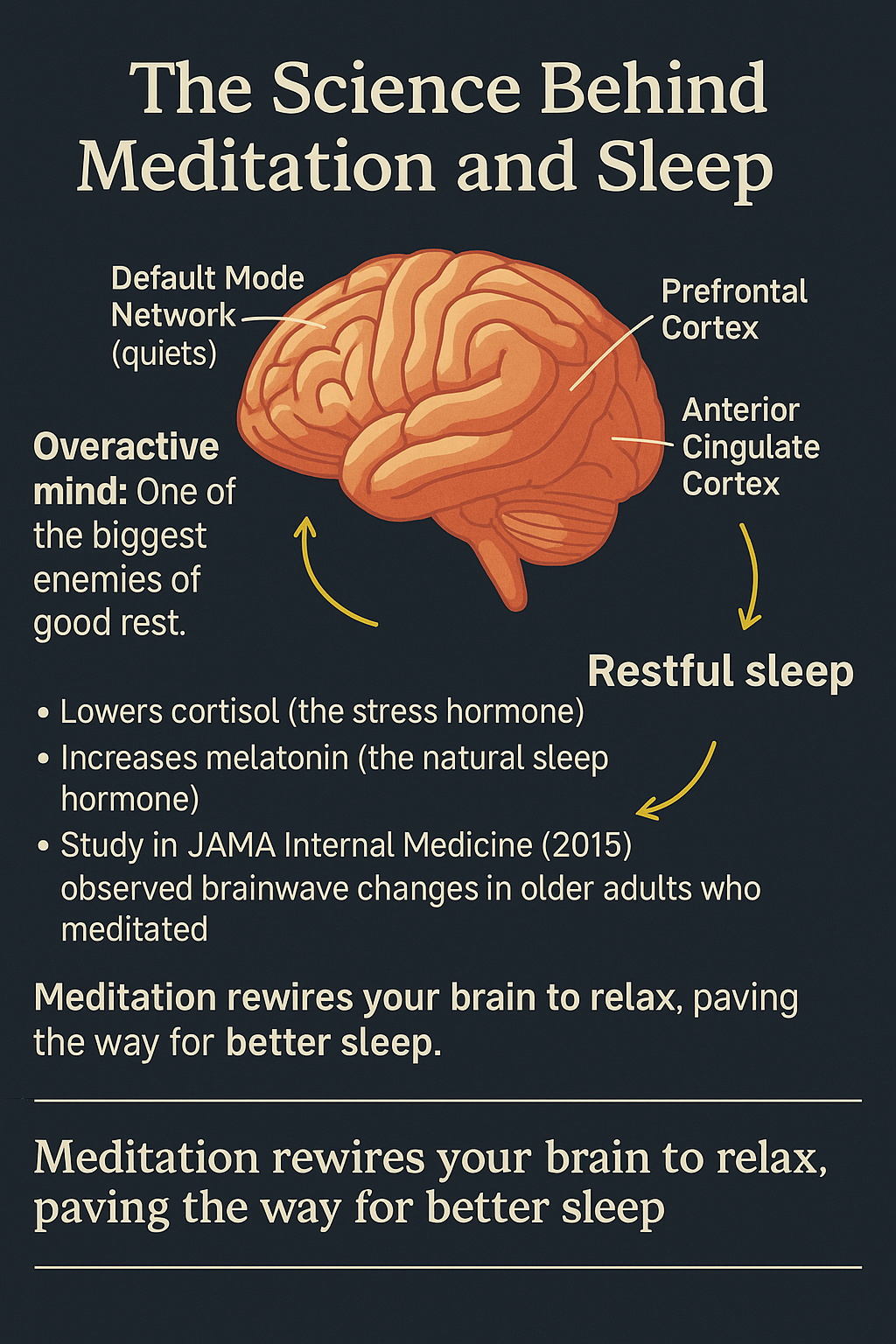
A study published in JAMA Internal Medicine (2015) found that older adults who practiced mindfulness meditation had improved sleep quality and less daytime fatigue.
These weren’t just subjective feelings—measurable brainwave changes were observed, showing more alpha waves (linked to relaxation) and fewer beta waves (linked to stress and alertness).
To put it simply:
Meditation rewires your brain to relax, and that relaxation becomes the gateway to restful sleep.
😵💫 How Stress and Anxiety Affect Your Sleep
Stress and anxiety don’t just keep your mind busy—they hijack your entire nervous system.
When you're anxious at night, your body activates the sympathetic nervous system, also known as “fight or flight.”
Your heart beats faster, your breath becomes shallow, and your brain stays hyper-alert.
All of this makes it nearly impossible to fall asleep, even if you’re exhausted.
I know this from experience.
There were nights when I was physically tired, but my mind kept replaying conversations or worrying about the next day.
It felt like my brain refused to shut down, no matter how tired my body was.
Meditation helps reverse this by engaging the parasympathetic nervous system—the “rest and digest” mode.
As you breathe slowly and focus your attention inward, your heart rate slows down, your cortisol levels drop, and your body gets the signal that it’s safe to relax.
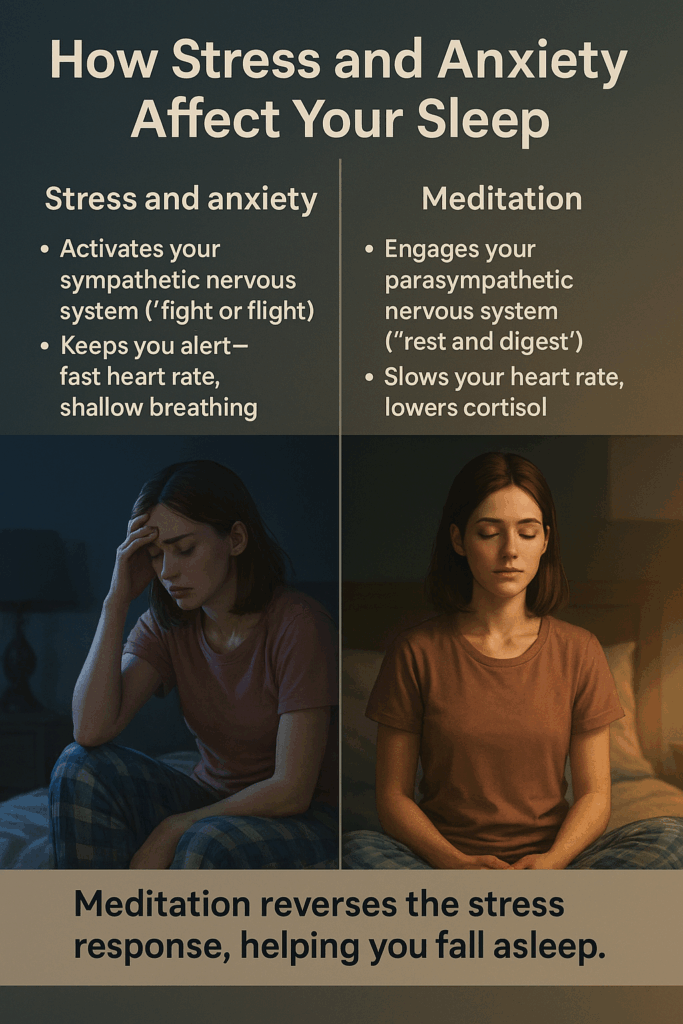
Scientific reviews support this too.
A meta-analysis in JAMA Internal Medicine (2014) showed that mindfulness-based meditation significantly reduces stress, anxiety, and improves sleep quality.
In short, meditation doesn’t just calm your thoughts—it resets your entire system, making it much easier to drift into deep, restorative sleep.
🌿 Meditation vs. Other Natural Sleep Solutions
There are many natural ways people try to improve their sleep—herbal teas, white noise machines, stretching, warm baths—but meditation stands out for one key reason: it directly trains your mind.
While warm tea or a bath may calm your body, meditation addresses the root of sleeplessness—mental restlessness.
I’ve personally tried many of these methods. Chamomile tea helped a little. Gentle yoga stretches made my body feel relaxed. But my thoughts? They kept racing—until I started meditating.
Especially when done 30 minutes before bed, meditation gave me a kind of mental “off switch” I hadn’t found anywhere else.
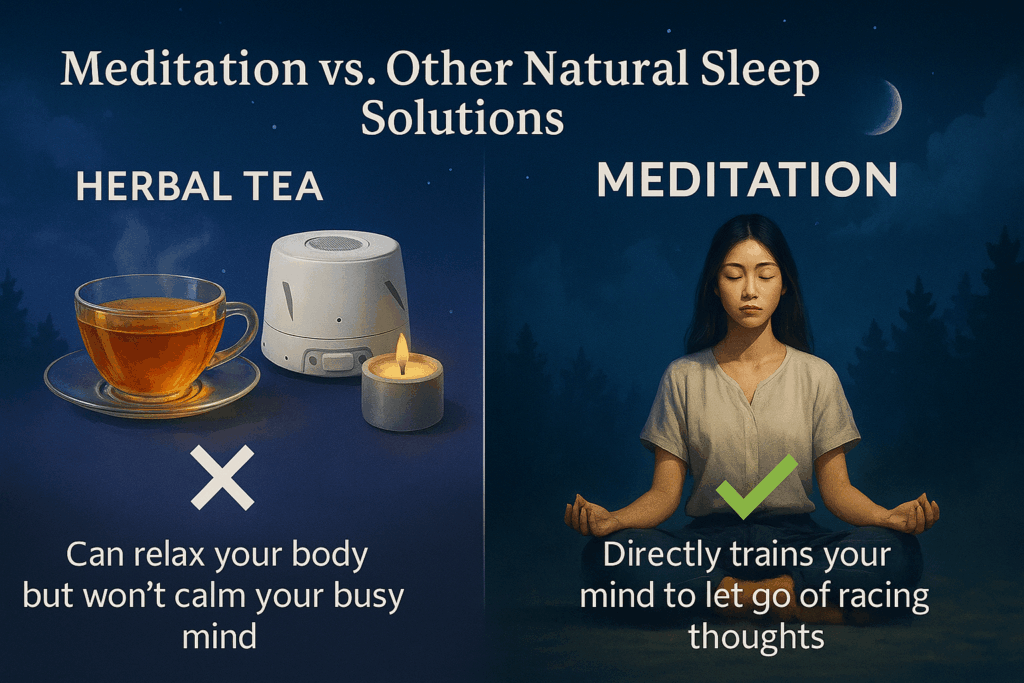
Studies back this up. In a review published by Current Opinion in Psychology (2017), researchers found that mindfulness meditation not only improves sleep quality, but also enhances emotional regulation, reduces anxiety, and supports long-term well-being—benefits most other methods don’t offer on their own.
That’s not to say you can’t combine techniques. In fact, sipping tea or doing light stretches before meditation may even enhance the effect.
But if you’re looking for a natural method that builds inner peace and improves sleep at its core, meditation is a powerful and proven choice.
🌙 Simple Bedtime Meditation Techniques
If you’re new to meditation, don’t worry—you don’t need to sit cross-legged for an hour to get results. Even 5–10 minutes of calm breathing can change the way your mind and body feel before bed.
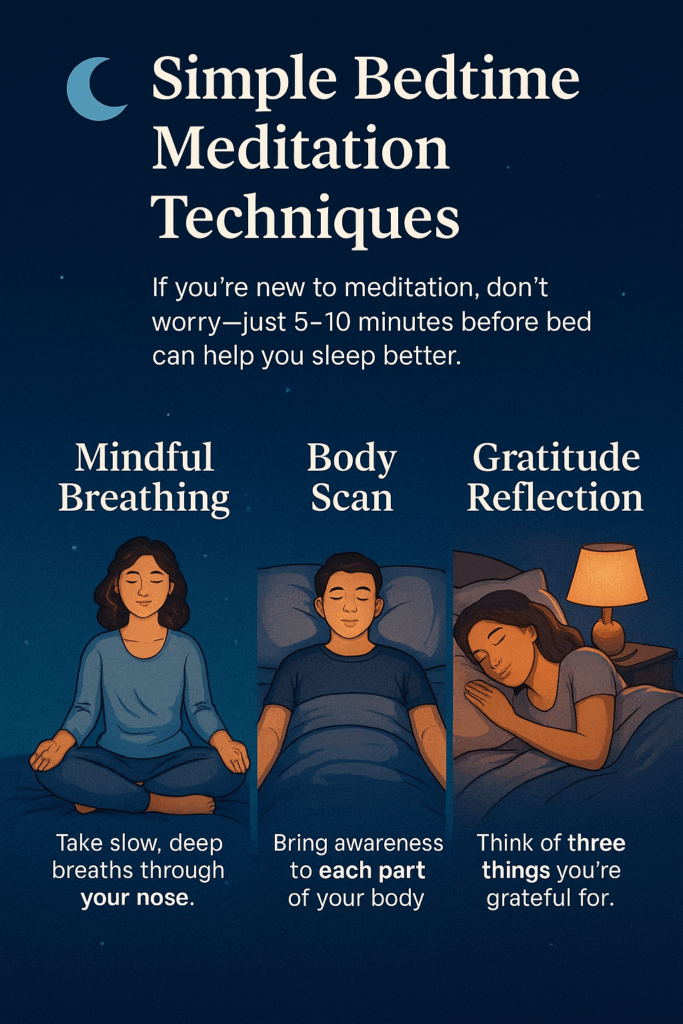
Here are a few simple techniques that have helped both me and others sleep better:
- Mindful Breathing: Sit or lie down comfortably, close your eyes, and bring your attention to your breath. Inhale slowly for 4 counts, exhale for 6. Repeat. If your mind wanders, gently return to the breath—no judgment needed.
- Body Scan: Start from your toes and slowly bring awareness to each part of your body, moving upward. This helps release tension you may not even notice.
- Gratitude Reflection: Before bed, think of 3 small things you’re thankful for. It shifts your focus from anxiety to appreciation.
Personally, I use mindful breathing most nights. But I’ve learned one thing the hard way: If I meditate right before I try to sleep, I sometimes become too alert. My sweet spot is about 30 minutes before bed, after I’ve turned off most lights and put away my phone.
These techniques aren’t just easy—they’re adaptable. You can do them sitting on your bed, lying down, or even while listening to soft music or rain sounds. The key is consistency: a few minutes each night can train your brain to relax when it matters most.
🛌 Step-by-Step Nighttime Meditation Routine
Creating a calming nighttime routine with meditation doesn’t have to be complicated. In fact, a simple and consistent practice is more effective than a perfect one.
Here’s a step-by-step routine I’ve personally followed—and it’s helped me ease into sleep on restless nights:
- Turn off bright lights and screens (at least 30 minutes before bed)
Blue light from phones and TVs can interfere with melatonin production. I dim the lights and use a warm lamp instead. - Prepare your environment
Light a candle or use a calming essential oil like lavender. Make sure your bed is inviting. These small cues tell your brain it's time to wind down. - Find a comfortable seated or lying position
I usually sit upright for meditation and lie down afterward. It helps me stay focused while meditating, but relaxed enough to transition to sleep. - Begin with 2–3 minutes of deep breathing
Inhale through your nose for 4 seconds, hold for 2 seconds, and exhale slowly for 6 seconds. Repeat. This helps calm your nervous system. - Do a short guided meditation (5–10 minutes)
You can use apps like Insight Timer, Calm, or just a YouTube video. Choose one focused on sleep or body relaxation. - End with a gentle affirmation or visualization
I often repeat something like: “I am safe, I am calm, I welcome rest.” Then I imagine myself floating on a quiet lake or resting in a peaceful forest. - Lie down and let go
After meditation, I lie on my back, let my body sink into the mattress, and just breathe naturally. No pressure to sleep—just rest.
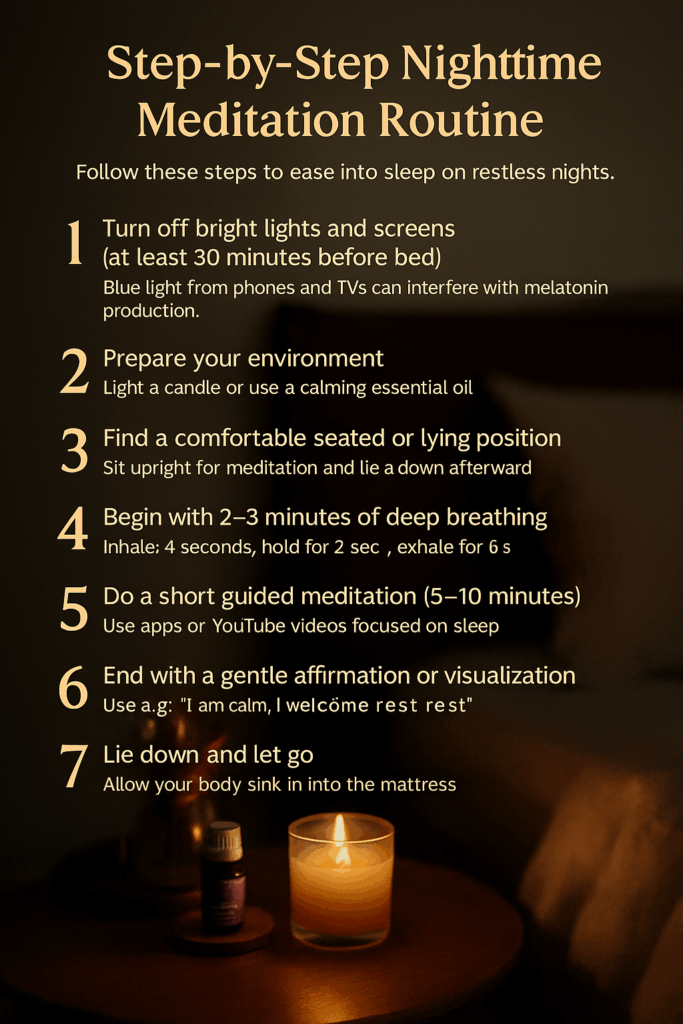
The goal here isn’t to force sleep, but to guide your body and mind toward it. When you treat sleep as something that arises naturally, not something you must control, it comes more easily.
🌌 Tips to Create a Calming Sleep Environment
Your sleep environment has a major influence on how quickly—and deeply—you fall asleep.
Even with the best meditation routine, a cluttered or overstimulating bedroom can sabotage your rest.
Here are a few tips that I personally follow to create a more peaceful space for sleep:
- Dim the lights after sunset
I switch from ceiling lights to warm, low-intensity lamps in the evening. This helps signal to my brain that it’s time to wind down. - Keep your room cool and clean
A cooler room (around 18–20°C or 65–68°F) promotes deeper sleep. I also keep clutter to a minimum—it’s amazing how physical mess creates mental stress. - Use calming scents
Lavender essential oil or Japanese hinoki (cypress) are my favorites. I sometimes place a few drops on my pillow or use a diffuser. - Invest in cozy bedding
Soft, breathable sheets and a pillow that fits your sleeping style can make a huge difference. I used to overlook this—but now I consider it part of my self-care. - Reduce noise and light pollution
If you live in a noisy area, white noise machines or earplugs can help. I also use blackout curtains to block outside light. - Add personal touches that bring peace
A photo that makes you smile, a favorite book nearby, or a soft blanket. Small things matter. Your bedroom should feel like a safe retreat—not just a place to crash.
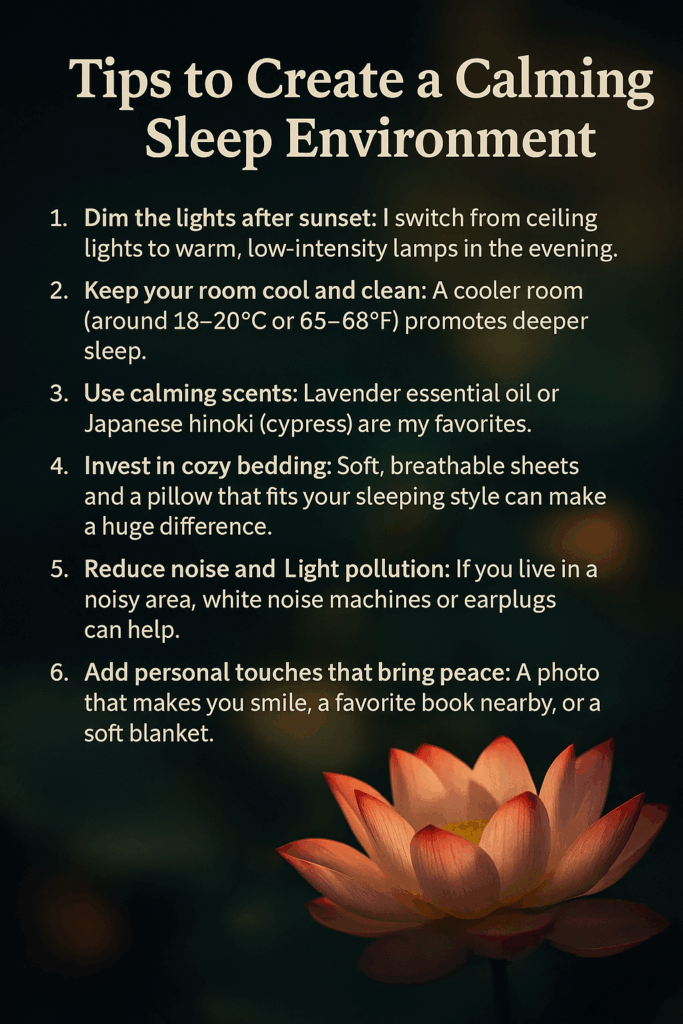
Meditation prepares your mind for sleep, but your environment sustains it.
Think of it this way: Meditation is the ignition, and your sleep space is the engine that keeps rest running smoothly.
💤 Common Sleep Problems and How Meditation Can Help
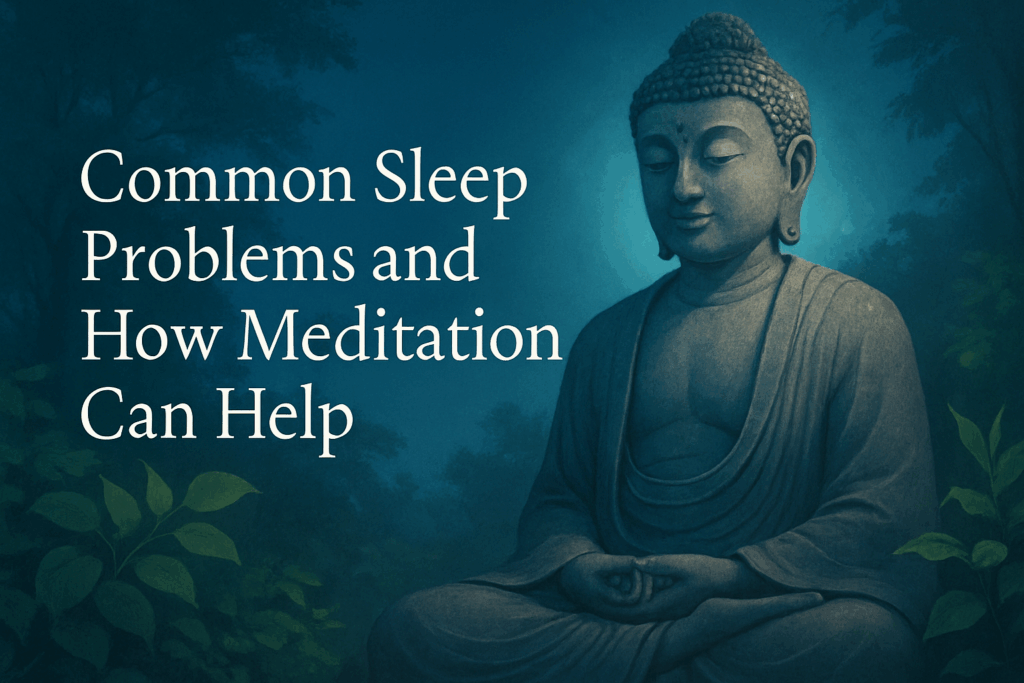
Sleep troubles are more common than most people realize. Even those who live a healthy lifestyle may find themselves lying awake at night, staring at the ceiling. For me, sleep has always been a challenge. Some nights, my thoughts race endlessly, while other times, I fall asleep only to wake up again at 3 AM, wide-eyed and restless.
Over the years, I’ve tried countless remedies—from herbal teas to sleep playlists—but nothing has helped as consistently as meditation. Let’s explore some of the most common sleep problems and how meditation can offer natural relief.
🌙 Trouble Falling Asleep: Meditation Solutions
You lie down, ready for rest, but your brain refuses to shut off. Sound familiar? This is often due to an overactive mind, stuck replaying past conversations or worrying about tomorrow.
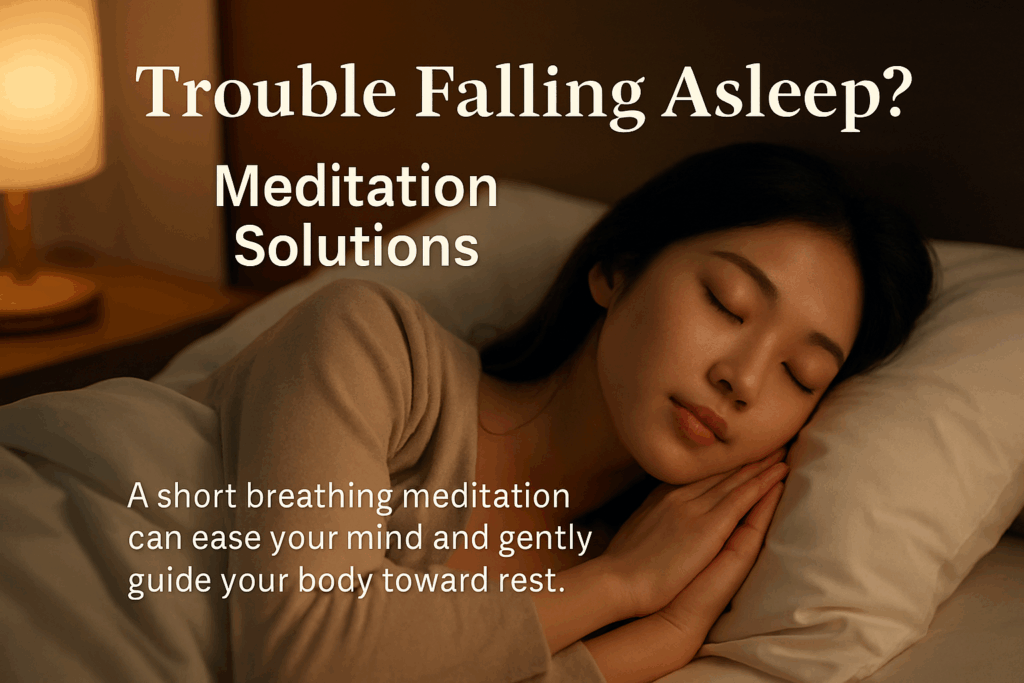
Meditation works by helping you shift attention away from those racing thoughts and toward the present moment—often through something simple, like your breath. I’ve found that doing a short breathing meditation while lying in bed helps ease my mind and signals my body that it’s time to rest. The key isn’t to force sleep but to gently guide yourself into a more relaxed state.
🌙 Waking Up at Night: How to Calm Your Mind
Even after falling asleep, some of us wake up during the night and struggle to drift off again. When this happens, it’s easy to get frustrated, making it even harder to sleep.
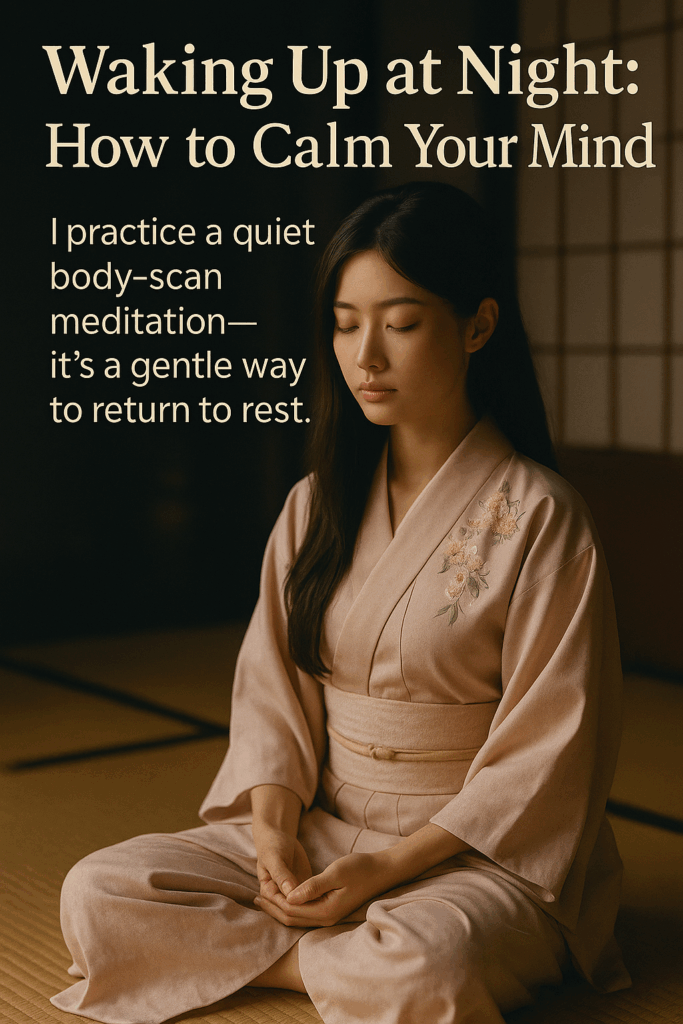
Instead of tossing and turning, I now practice a quiet body-scan meditation. I slowly bring my attention to different parts of my body—from toes to head—without judgment. This simple shift in focus calms my nervous system and, more often than not, helps me fall asleep again within minutes. It’s a gentle, grounding way to return to rest.
🌙 Reducing Dependence on Sleep Medication
Many people turn to sleeping pills when they can’t find relief. While medication can be helpful in some cases, it often comes with side effects or leads to dependency.
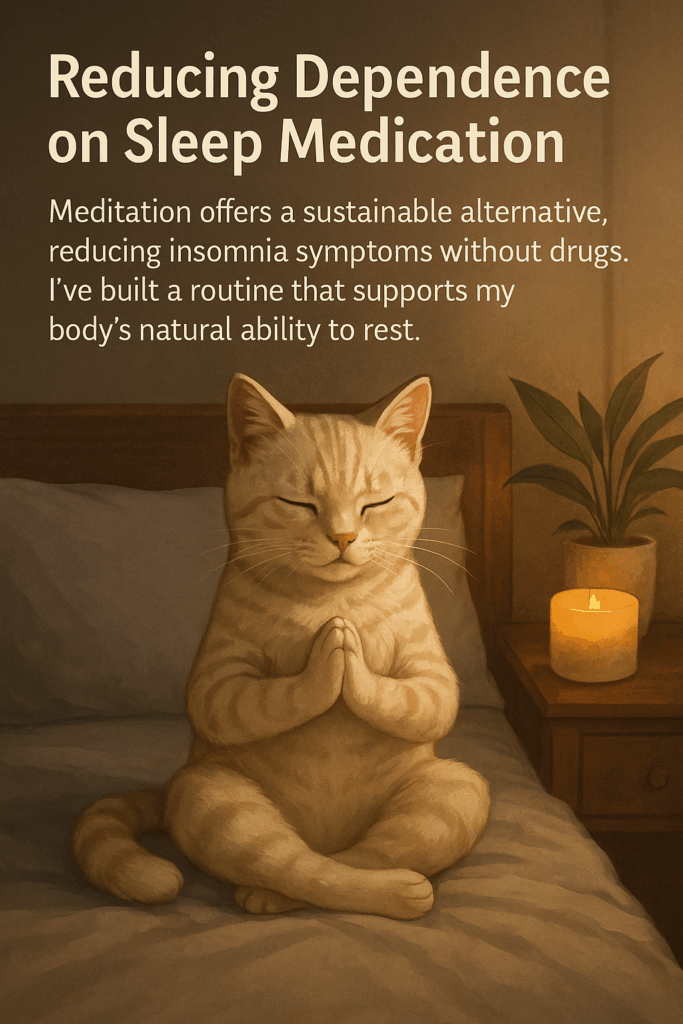
Meditation offers a sustainable, side-effect-free alternative. Studies show that mindfulness-based therapies can significantly reduce insomnia symptoms and improve sleep quality without medication. Personally, using meditation as a nightly ritual has not only improved my sleep but also helped me feel more in control of my mental health.
Rather than relying on pills, I’ve built a routine that supports my body’s natural ability to rest—starting with just five minutes of mindfulness before bed.
🔗Gong H, et al. – Mindfulness-Based Therapy for Insomnia: A Meta-Analysis (Explore NY, 2016)
This meta-analysis confirms the effectiveness of mindfulness-based therapy in improving symptoms of insomnia.
🌀Frequently Asked Questions About Meditation for Better Sleep
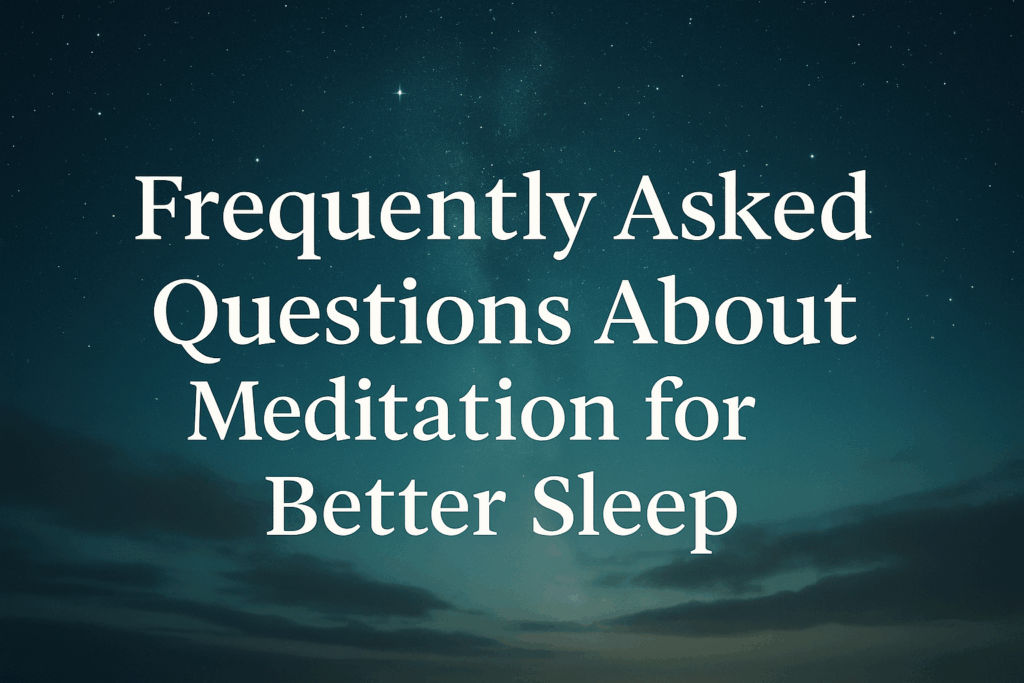
If you’re curious about using meditation to improve your sleep, you're not alone. Many people wonder how it works, whether it’s suitable for beginners, or how long it takes to feel the effects. I’ve asked the same questions myself—and through both personal experience and research, I’ve found some reassuring answers that might help you get started with confidence.
❓ How Long Should You Meditate Before Bed?
You don’t need to meditate for a long time to see results. Even 5 to 10 minutes of mindful breathing or guided meditation can calm your nervous system and prepare your mind for rest. The important part is consistency.
From my own experience, I usually meditate about 30 minutes before bed—not right before lying down. If I meditate too close to bedtime, I sometimes feel more alert instead of sleepy. Finding the right timing can make a big difference.
❓ Can Beginners Try Sleep Meditation?
Yes, absolutely. Sleep meditation is simple and beginner-friendly. You don’t need any special skills or experience. In fact, many apps offer free guided meditations that gently lead you through the process.
When I started, I worried I might be “doing it wrong.” But I soon realized that meditation isn’t about perfection—it’s about intention and presence. Even if your mind wanders, that’s okay. Gently bringing it back is part of the practice.
❓ What If Meditation Doesn’t Work Right Away?
This is one of the most common concerns—and it's a valid one. Meditation isn't a quick fix, but a gentle retraining of the mind. Just like going to the gym, it takes a bit of time before you see results.
There were nights when I didn’t feel immediate relief. But over time, I noticed that even when I couldn’t sleep right away, I felt less anxious and more at peace. That alone helped me break the cycle of sleepless frustration. Stick with it—it’s worth it.
🔗Sleep Foundation – Meditation and Sleep
The Sleep Foundation provides beginner-friendly explanations on how meditation improves sleep and answers common questions.
🌙 Final Thoughts: Let Meditation Guide You Into Restful Sleep
Sleep doesn’t always come easy—especially in a world full of stress, noise, and endless to-do lists. But meditation offers a gentle, natural way to reconnect with your breath, your body, and your inner calm. Whether you're struggling to fall asleep, waking up in the middle of the night, or just feeling exhausted every morning, meditation can help shift your sleep from a nightly battle to a peaceful ritual.
From both personal experience and scientific evidence, one thing is clear: meditation is not just about sleep—it’s about healing your relationship with rest. It teaches you to slow down, to let go, and to be present with yourself at the end of the day.
So tonight, instead of reaching for your phone or stressing over tomorrow, try something different. Sit in stillness, follow your breath, and give yourself the gift of quiet. Your mind—and your body—will thank you.
Sweet dreams. 💤
